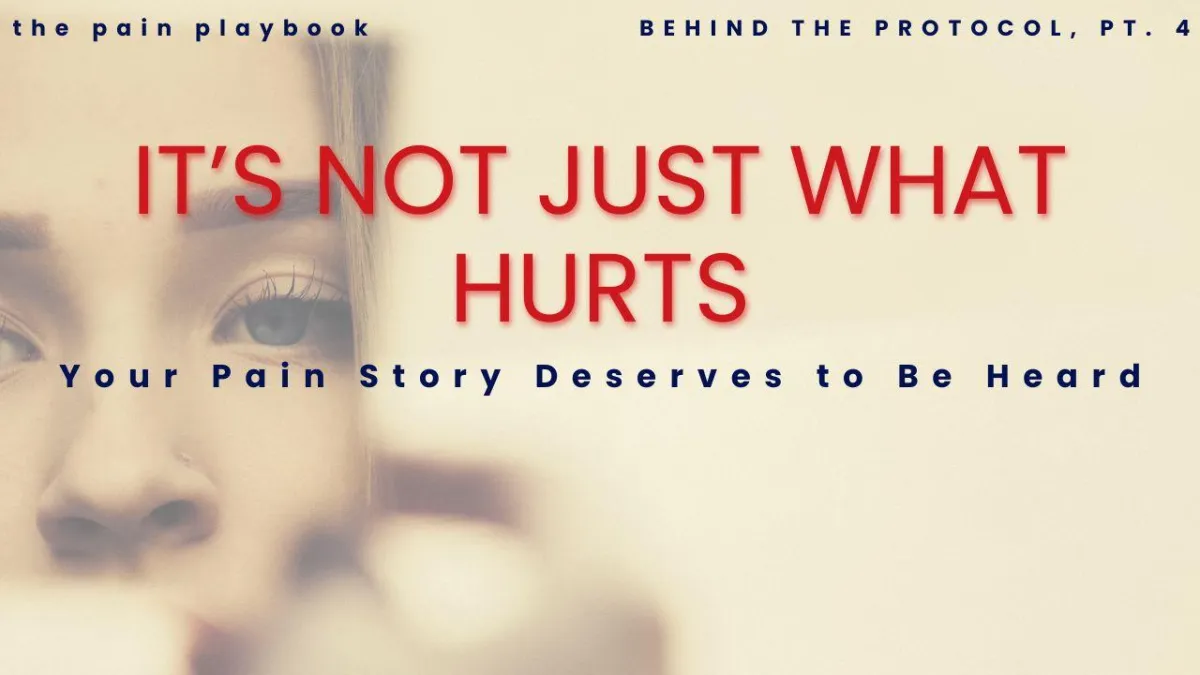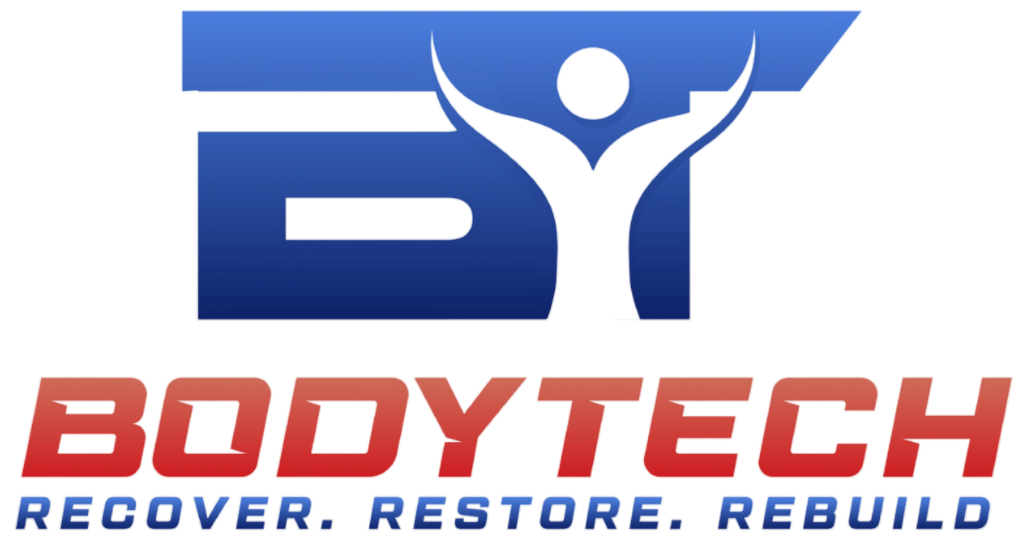The Pain Playbook Blog
Talking Everything Pain
Welcome to the conversation!
Building a community and sharing resources dealing with everything pain

It's Not Just What Hurts
Why You Keep Getting Stuck
(And How to Break the Cycle)
Behind the Protocol, Part 4
You can be cleared… and still confused.
You can be mobile… and still stuck.
You can be strong… and still feel like your body’s not on your side.
This is what pain does when we don’t know how to talk to it. Or listen to it. Or even recognize the way we tend to respond when it shows up.
Not just physically but also emotionally, behaviorally, and socially.
And most of us don’t even realize we have a pattern.
Why Pain Feels Like a Dead-End — Even When It’s a Detour
Let’s be clear: pain is not the enemy.
It’s a signal. A boundary. A nudge (or scream) from the body that says: “Hey. Something needs attention.”
But what do we do with that signal? That’s where things can either move forward or keep looping back.
At BodyTech, we see it again and again:
The Hero: Pushes through. Overperforms. Downplays everything… until it crashes them.
The Tracker: Microscopes every twinge, over-researches, spirals into hypervigilance.
The Dismisser: Waits until the pain is screaming, then wonders how it got so bad.
The Strategist: Tries to outsmart the pain with plans, but still struggles with follow-through or fear.
None of these types are “wrong.”
They’re coping styles. Learned behaviors. They are survival strategies. And they do shape recovery.
Your Pain Personality™: A Mirror, not a Label
We use the Pain Personality™ scale to open up the conversation rather than box it in.
It helps see the patterns behind the pain:
Do you tend to ignore pain until it explodes?
Do you catastrophize and spin your wheels?
Do you find yourself needing constant validation… or feeling frustrated by “having to rest”?
Knowing your type helps you advocate for what you actually need:
A provider who validates and calms you (if you’re a Tracker)
Boundaries on your workload and output (if you’re a Hero)
A system to slow down and pay attention earlier (if you’re a Dismisser)
Structure without rigidity (if you’re a Strategist)
And when you bring that awareness into the gym, into the ring, into your training sessions, it changes how your whole team can support you.
A Client Example: Tony, 58 — “Pain is just part of the process”
Tony is an old-school bodybuilder.
Built like a tank.
Trained through the golden era of “no pain, no gain.”
Torn rotator? Tape it up.
Back tight? Belt up and deadlift anyway.
Pain was just background noise, just something to push past, work around, and override.
Until it wasn’t.
At 58, years of “grinding through” finally caught up.
Low back pain turned into nerve pain.
Shoulder stiffness made even basic movements feel sketchy.
And the worst part? He didn’t feel strong anymore. He felt fragile.
He didn’t say it out loud at first.
But you could see it in how he moved: holding tension, bracing, flinching.
Trying to stay tough… but not trusting his body.
When Tony came to BodyTech, he expected more treatment.
He expected manual work, some movement tweaks, maybe a few pro tips.
What he didn’t expect was the pause. The conversation. The invitation to stop powering through and actually listen to what his body was saying.
Because when you’ve spent decades ignoring pain, learning how to respond to it feels like weakness.
But it’s not.It’s a skill. One that saved his lifting, and his confidence.
We didn’t just rehab his spine and improve mobility.We helped him rewrite the internal script that said: “If it doesn’t hurt, I’m not trying hard enough.”
And that’s when recovery really started.
Pain Personality™ Insight:
Tony showed up as a classic Hero — the type who pushes through, keeps quiet, and ties strength to grit.
He already had a huge reserve of willpower. What he needed was strategy.
We helped him shift toward a more Strategist mindset — where pain wasn’t the enemy, but a signal. A guide. A map for smarter recovery.
Pain Isn’t a Test to Pass. It’s a Map to Follow.
If you’re stuck in a cycle of getting “better,” only to backslide again, it’s not a sign of failure. It’s a sign you might be listening to the wrong part of the conversation.
Pain has a personality. And you do too.
Learning how to communicate with it, and support yourself through it, can be the difference between a recovery that drags… and the recovery that rebuilds you stronger than before.
Let us know your story. Email us at bodytechnyc@gmail.com to uncover out your Pain Personality.

It's Not Just What Hurts
Why You Keep Getting Stuck
(And How to Break the Cycle)
Behind the Protocol, Part 4
You can be cleared… and still confused.
You can be mobile… and still stuck.
You can be strong… and still feel like your body’s not on your side.
This is what pain does when we don’t know how to talk to it. Or listen to it. Or even recognize the way we tend to respond when it shows up.
Not just physically but also emotionally, behaviorally, and socially.
And most of us don’t even realize we have a pattern.
Why Pain Feels Like a Dead-End — Even When It’s a Detour
Let’s be clear: pain is not the enemy.
It’s a signal. A boundary. A nudge (or scream) from the body that says: “Hey. Something needs attention.”
But what do we do with that signal? That’s where things can either move forward or keep looping back.
At BodyTech, we see it again and again:
The Hero: Pushes through. Overperforms. Downplays everything… until it crashes them.
The Tracker: Microscopes every twinge, over-researches, spirals into hypervigilance.
The Dismisser: Waits until the pain is screaming, then wonders how it got so bad.
The Strategist: Tries to outsmart the pain with plans, but still struggles with follow-through or fear.
None of these types are “wrong.”
They’re coping styles. Learned behaviors. They are survival strategies. And they do shape recovery.
Your Pain Personality™: A Mirror, not a Label
We use the Pain Personality™ scale to open up the conversation rather than box it in.
It helps see the patterns behind the pain:
Do you tend to ignore pain until it explodes?
Do you catastrophize and spin your wheels?
Do you find yourself needing constant validation… or feeling frustrated by “having to rest”?
Knowing your type helps you advocate for what you actually need:
A provider who validates and calms you (if you’re a Tracker)
Boundaries on your workload and output (if you’re a Hero)
A system to slow down and pay attention earlier (if you’re a Dismisser)
Structure without rigidity (if you’re a Strategist)
And when you bring that awareness into the gym, into the ring, into your training sessions, it changes how your whole team can support you.
A Client Example: Tony, 58 — “Pain is just part of the process”
Tony is an old-school bodybuilder.
Built like a tank.
Trained through the golden era of “no pain, no gain.”
Torn rotator? Tape it up.
Back tight? Belt up and deadlift anyway.
Pain was just background noise, just something to push past, work around, and override.
Until it wasn’t.
At 58, years of “grinding through” finally caught up.
Low back pain turned into nerve pain.
Shoulder stiffness made even basic movements feel sketchy.
And the worst part? He didn’t feel strong anymore. He felt fragile.
He didn’t say it out loud at first.
But you could see it in how he moved: holding tension, bracing, flinching.
Trying to stay tough… but not trusting his body.
When Tony came to BodyTech, he expected more treatment.
He expected manual work, some movement tweaks, maybe a few pro tips.
What he didn’t expect was the pause. The conversation. The invitation to stop powering through and actually listen to what his body was saying.
Because when you’ve spent decades ignoring pain, learning how to respond to it feels like weakness.
But it’s not.It’s a skill. One that saved his lifting, and his confidence.
We didn’t just rehab his spine and improve mobility.We helped him rewrite the internal script that said: “If it doesn’t hurt, I’m not trying hard enough.”
And that’s when recovery really started.
Pain Personality™ Insight:
Tony showed up as a classic Hero — the type who pushes through, keeps quiet, and ties strength to grit.
He already had a huge reserve of willpower. What he needed was strategy.
We helped him shift toward a more Strategist mindset — where pain wasn’t the enemy, but a signal. A guide. A map for smarter recovery.
Pain Isn’t a Test to Pass. It’s a Map to Follow.
If you’re stuck in a cycle of getting “better,” only to backslide again, it’s not a sign of failure. It’s a sign you might be listening to the wrong part of the conversation.
Pain has a personality. And you do too.
Learning how to communicate with it, and support yourself through it, can be the difference between a recovery that drags… and the recovery that rebuilds you stronger than before.
Let us know your story. Email us at bodytechnyc@gmail.com to uncover out your Pain Personality.



